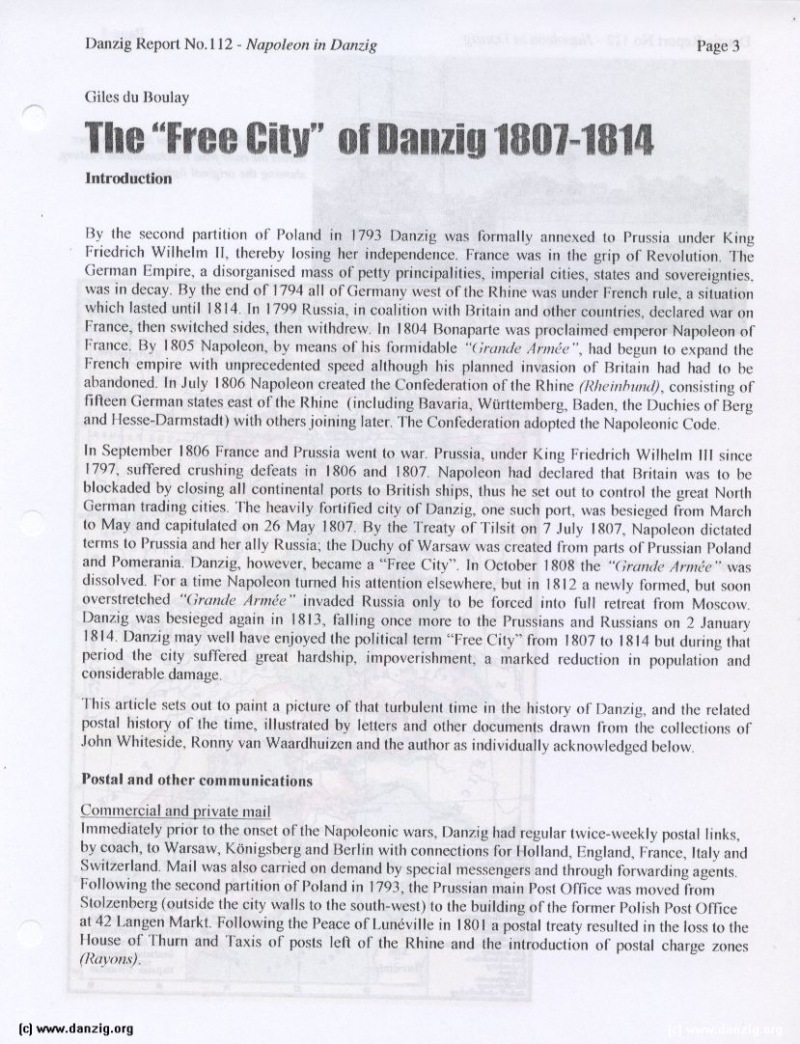
Giles du Boulay
The “Free City” of Danzig 1807-1814
Introduction
By the second pai iltoit of’ Poland in I 793 1 )oniig was flrinal lv annexed to Prussia under King Friedrich Wilhelm II. thereby losing her independence. France was in the grip of Revolution. I he German Empire. a disorganised mass of petty principalities, imperial cities, slates and sovereignties. was in decay. By the end of 1794 all of Germany west of the Rhine was tinder French rule, a situation which lasted until 1814 In 1799 Russia. in coalition with Britain and other countries, declared war on France. thcui switched sides, theti sithdrew Iii 1804 Bonaparte sas proclaimed emperor Napoleon of France, fly I 805 Napoleon. by means of his firm idable “(iru,id’ .lr,n& ‘, had begun to expaiid the French empire with unprecedented speed although his planned invasion of Bntain had had to be abandoned. In July 1806 Napoleon created the Confederation of the Rhine (l?h’inhund), consisting of lifleen German stales east of the Rhine (including Bavaria, WUrtlemberg, Badc,i, the I)uchies of Berg and I Icssc—Darmstadt ) with others joining later, [he ConIdcratiomi adopted the Napoleonic Code
In September I 806 France and Prussia sent to war. Prussia, tinder King Friedrich Wilhelm Ill since 1797, suffered crushing defeats in 1806 and 1807. Napoleon had declared that Britain was to be blockaded by closing all continental ports to British ships, thus he set out to control the great North (lerman trading cities ‘the heavily fortified city of l)aniig, one such port, was besieged from March to May and capitulated on 26 May 1807 fly the treaty of’ ‘l’ilsit on 7 July 1807. Napoleon dictated terms to Prussia and her ally Rtissia the l)uchv of Warsaw was created from parts of Prussiami Poland and Pomerania. J)anzg, however, became a “Free City”. In October 1808 the ‘Grande Arme’ was dissolved. For a time Napoleon turned his attention elsewhere, but in 1812 a newly formed, hut soon (werstretched “Gru&k• ,4rm& invaded Russia only to be frccd into full retreat from Moscow I)nnzig was besieged again in 1813, falling once more to the Prussians and Russians on 2 January 1814 I)aniig may well hae enjoyed the political term “Free City” from 1807 to 1814 but during that period the city suffered great hardship. impoverishment, a marked reduction in population and considerable damage
This article sets out to paint a Ilictuire of that teimlnilcut time in the history of I)aniig, and the related postal history of the time, illustrated by letters and other documents drawn horn the collections of John Whiteside, Ronnv van Waardhuizen and the author as individually acknowledged below,
Postal and other communications
Commercial and private mail
Immediately prior to the onset of the Napoleonic wars. Danzig find regular twice weekly postal links, by coach, to Warsaw, Konigsberg and Berlin with connections for Holland, England. Fiance, Italy and Switzerland Mail was also carried on demand by special messengers and through forwarding agents Following the second partition of Poland in 1793, the Prussian main Post 0111cc was moved ironi Stoli.enberg (outside the city walls to I he south— west) to the building of the fir iner Polish Post 0111cc at 42 Langcni Markt. Following the Peace of I.unëville in 1801 a postal treaty resulted in the loss to the I louse of Thurn and Taxis of’ posts left of the Rhine and the introduction of postal charge zones (Rayons).
Danzig Report Vol. 1 - Nr. 112 - July - August - September - 2001, Page 3.
Hits: 3337
Added: 29/07/2015
Copyright: 2024 Danzig.org

